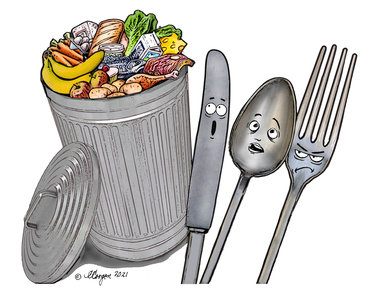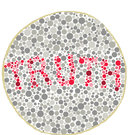Saving the planet, one clean plate at a time
“Waste not, want not,” was a favorite directive of my grandparents.
One day, during my teenage years, while I arranged my hair in front of the bathroom mirror, my cheeks flushed bright red as my grandfather bent to pluck from the scrap basket a bent bobby pin I’d tossed out.
Silently, he straightened it and handed it back to me. I thanked him as I put it in my hair.
As kids, we were also told to “clean” our plates at meal time; children were starving in China.
But hunger is not a far-off problem. It is here in our midst.
The Guilderland Food Pantry recently sent out a flyer saying that 1,100 families in Guilderland have incomes at or below the poverty line and about 550 families with school-aged children qualify for free or reduced-price lunches.
The food pantry does heroic work, turning donations into sustenance for those who need it.
The pandemic has laid bare many disparities in our society and focused the need for both government and individual action to solve the now-evident problems.
One of the initiatives started by New York State during the pandemic, the Nourish New York program, similar to the roots of food stamps during the Great Depression, pairs local farmers who have surplus produce with people who are hungry. We are pleased this program will continue past the pandemic.
The waste-not-want-not philosophy behind that program is found, too, in regulations the state’s Department of Environmental Conservation has proposed to improve food-scrap recycling and prevent food waste. Not only would this help feed hungry New Yorkers, it would also help prevent climate change.
Designated food-scrap generators like restaurants, supermarkets, hotels, universities, food processors, prisons, and sports venues that create an annual average of two tons of food scraps or more each week would be required to donate their excess food. Scraps that are not usable would be recycled in an organics facility.
Currently, tens of thousands of tons of food scraps are regularly buried in landfills. Not only does that fill space that could be better used for other waste but, as the food decomposes, it creates huge amounts of methane, a greenhouse gas far more potent than carbon dioxide.
If communities around the world were to compost instead of burying food to rot, the carbon savings would be equal to taking about 15 million passenger cars off the road for 30 years, according to Project Drawdown, a not-for-profit organization that seeks to help the world reach “Drawdown” — the future point in time when levels of greenhouse gases in the atmosphere stop climbing and start to steadily decline.
Nearly half of the solid waste produced globally is organic or biodegradable. The United States is among the worst offenders.
This is a problem that can be solved both on an individual level and with government leadership. The state of Vermont in 2012 passed a universal recycling law, similar to the current DEC proposal, barring big waste generators from throwing out uneaten food and, in 2020, expanded the program to cover all residents. Vermont is the first state to require food waste be separated from other trash and waste haulers must provide pick-up service for people who cannot compost at home.
Individual municipalities in New York State, some of them close to home, have adopted programs for residents to have food waste be composted. For decades on this page, we have extolled the virtues of composting, explaining the relatively simple procedure that turns waste into rich fertilizer.
We are pleased that last week President Joe Biden made it clear the United States is once again going to become a world leader in working to solve the climate crisis. His goal of cutting greenhouse gases nearly in half by 2030 is ambitious but achievable if we work together. Any one of our municipalities or anyone of us as individuals can help.
The Albany Common Council recently declared a climate emergency.
“Facing the possibility of more intense storms, out of whack weather patterns that affect crop production, frequent flooding in some areas, and droughts in others, the costs of letting this happen is too much to bear,” said Councilman Owusu Anane in a statement, announcing the resolution.
We can make a difference, each one of us, when it comes to food scraps.
Over a third of all the food grown in the United States is not eaten. “In 2019, an enormous 35 percent of all food in the United States went unsold or uneaten,” according to ReFED, a national not-for-profit working to end food loss and waste across the U.S. food system.
That lost $408 billion worth of food is roughly 2 percent of U.S. gross domestic product, with a greenhouse gas footprint equivalent to 4 percent of total U.S. greenhouse gas emissions.
ReFED says the largest proportion of food waste, about 37 percent, happens in the home. So, while the new DEC food scrap regulations are to go into effect in January to deal with large food-scrap generators, each of us can make a difference in our own homes.
We should buy only what we need, what we will actually prepare and eat. If we buy locally, the food will stay fresh longer, support the local economy, and reduce greenhouse gas from shipping. And, after we prepare and eat our food, we should compost any leftover scraps.
Our household finances will improve, too. A 2020 study in Nutritional Journal found that consumers spent, on average, over one-quarter of their daily food budget on food that ended up being wasted, representing over $3.50 per day. Meat and seafood accounted for the greatest proportion of daily food budgets spent on wasted food, followed by fruits and vegetables, grains, sweets, and dairy.
This means the average American consumer spends roughly $1,300 per year on food that ends up being wasted — which is more than Americans on average spend on vehicle gasoline ($1,250); apparel ($1,207); household heating and electricity ($1,149); property taxes ($1,046); and household maintenance, repairs and insurance ($936).
If the arguments to help save the climate are too amorphous, maybe saving dollars will motivate us to stop our massive waste of food.
As my grandparents used to say: Waste not, want not.


